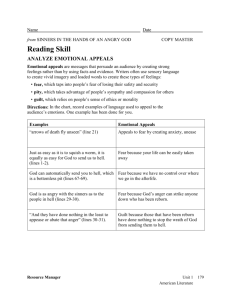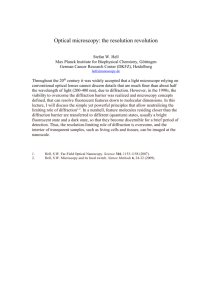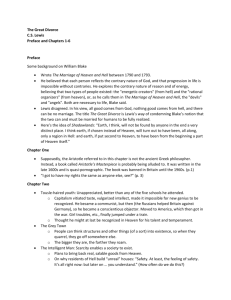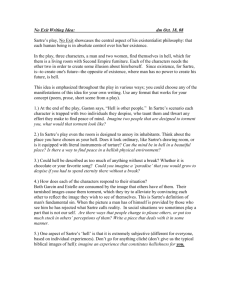026 The Devil and Hell - Swedenborg Association of Australia
advertisement
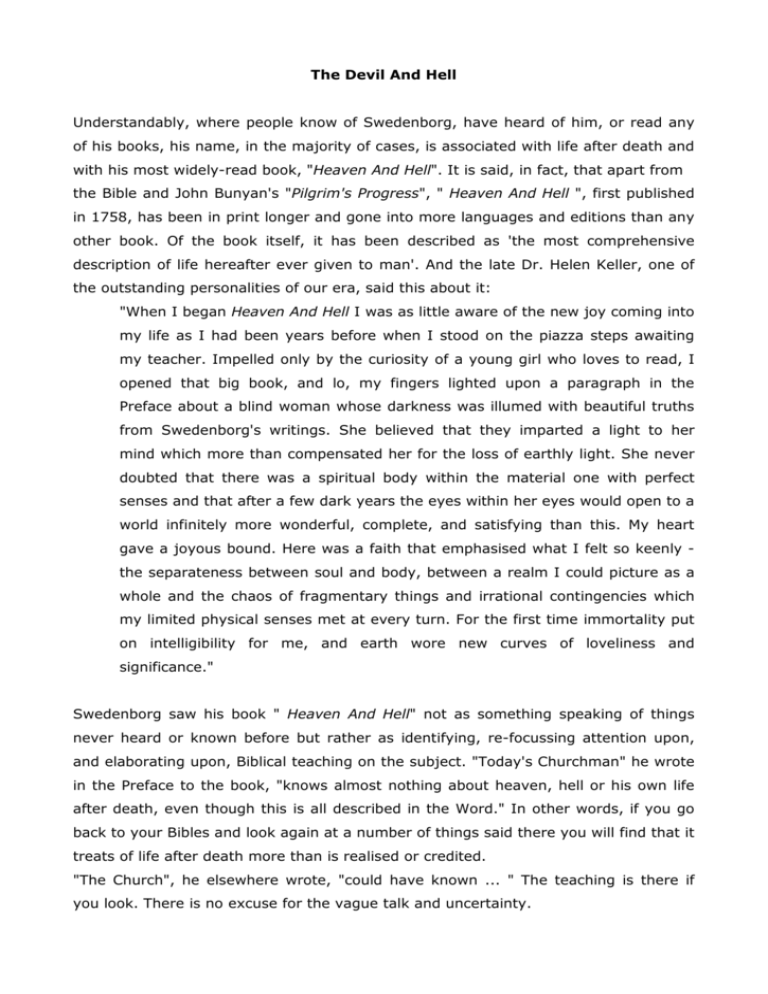
The Devil And Hell Understandably, where people know of Swedenborg, have heard of him, or read any of his books, his name, in the majority of cases, is associated with life after death and with his most widely-read book, "Heaven And Hell". It is said, in fact, that apart from the Bible and John Bunyan's "Pilgrim's Progress", " Heaven And Hell ", first published in 1758, has been in print longer and gone into more languages and editions than any other book. Of the book itself, it has been described as 'the most comprehensive description of life hereafter ever given to man'. And the late Dr. Helen Keller, one of the outstanding personalities of our era, said this about it: "When I began Heaven And Hell I was as little aware of the new joy coming into my life as I had been years before when I stood on the piazza steps awaiting my teacher. Impelled only by the curiosity of a young girl who loves to read, I opened that big book, and lo, my fingers lighted upon a paragraph in the Preface about a blind woman whose darkness was illumed with beautiful truths from Swedenborg's writings. She believed that they imparted a light to her mind which more than compensated her for the loss of earthly light. She never doubted that there was a spiritual body within the material one with perfect senses and that after a few dark years the eyes within her eyes would open to a world infinitely more wonderful, complete, and satisfying than this. My heart gave a joyous bound. Here was a faith that emphasised what I felt so keenly the separateness between soul and body, between a realm I could picture as a whole and the chaos of fragmentary things and irrational contingencies which my limited physical senses met at every turn. For the first time immortality put on intelligibility for me, and earth wore new curves of loveliness and significance." Swedenborg saw his book " Heaven And Hell" not as something speaking of things never heard or known before but rather as identifying, re-focussing attention upon, and elaborating upon, Biblical teaching on the subject. "Today's Churchman" he wrote in the Preface to the book, "knows almost nothing about heaven, hell or his own life after death, even though this is all described in the Word." In other words, if you go back to your Bibles and look again at a number of things said there you will find that it treats of life after death more than is realised or credited. "The Church", he elsewhere wrote, "could have known ... " The teaching is there if you look. There is no excuse for the vague talk and uncertainty. The Lord's words to the penitent thief crucified alongside of Him are a case in point. Asking Jesus, "to remember me when you come in your kingly power", (as the Revised Standard Version has it), the Lord replied, "Truly, I say to you, today you will be with me in Paradise (Luke 23: 41-42). Then again there is the parable of the rich man and Lazarus, Luke Chapter 16, so often – strangely - overlooked, or never really taken into account, for what in fact is the wealth of information it supplies on the subject. For example, it makes clear that the way we freely choose to live in this world, selfishly or unselfishly, determines whether we go to heaven or hell after we die. Once again, this matter of more or less immediate resurrection into the spiritual world is touched upon. Do you remember how it reads? "There was a rich man, who was clothed in purple and fine linen and who feasted sumptuously every day. And at his gate lay a poor man named Lazarus, full of sores, who desired to be fed with what fell from the rich man's table: moreover dogs came and licked his sores. The poor man died and was carried by the angels into Abraham's bosom. The rich man also died and was buried and in Hades, being in torment, he lifted up his eyes, and saw Abraham and Lazarus in his bosom." (Luke 16: 19-23). It was, you see, as straightforward as that. The poor man died and was in heaven. The selfish, uncaring, rich man died and was in hell. Death was hardly even an interruption in their continuing lives. It is not, however, my intention to dwell at length on such Biblical teaching concerning life after death, though obviously we could do. Rather, I had in mind to talk more specifically about hell and the devil about both of which there is Biblical teaching but which, by and large, are largely looked upon as antiquarian concepts and are often the subject of laughter and amusement. If I could summarise popular thinking about hell, it is regarded (and not suprisingly because of the Biblical teaching about it) as a place of everlasting fire and torment. The impression is that people are sent to hell, even against their will, even kept there against their will. And, when it comes to the Devil or Satan, the Bible seems to speak of him in a personal way, and people do as well. I was recently reading an article by a greatly respected Christian writer and lecturer who wrote of something as "the tool of Satan himself" using such words, elsewhere in the article, as "the demonic insights of God's greatest adversary". Clearly his inference is that Satan, or the Devil, is the dark, malevolent, shadowy being he has come to be thought of - the creature parents once would frighten children with. To be sure, the Bible does talk of hell and of it being eternal and a place of torment. The well-known words of Jesus, in Matthew Chapter 18 and elsewhere bear this out: "And if your hand or your foot causes you to sin, cut it off and throw it from you: it is better for you to enter life maimed or lame than with two hands or two feet to be thrown into the eternal fire. And if your eye causes you to sin, pluck it out and throw it from you: it is better for you to enter life with one eye than with two eyes to be thrown into hell fire." Clearly, though, there is room for further comment and explanation here which is what is given in the book "Heaven And Hell". When people go to hell they do so because they have chosen it in preference to going to heaven. It sounds extraordinary, but it's true. No one is sent to hell. People go there of their own freewill. They go there because they are more comfortable and at home there than they would be anywhere else. They can be themselves there which they can't be in heaven. It still sounds extraordinary, doesn't it? And that's because of the picture of hell we have; how we imagine it in our minds to be. In reality, Jesus was talking figuratively, or symbolically, when He referred to hell fire. It's not an actual physical thing, outside of a person, or outside of people, flames licking up around them and that sort of thing. Hell fire is the burning, consuming passion evil people have - indeed, which we all feel within ourselves from time to time - to take revenge, or to bring another person down a peg or two, to get our own way, to profit unfairly, or whatever it is. You know how this is. We speak of people 'flaring up' if they are provoked. We also speak of 'heated' arguments and of a person having a 'hot' temper. You have perhaps heard people say they have a 'burning' desire to do something. In Isaiah Chapter 9, at verse 18, there is the very powerful statement, "wickedness burns like a fire". And how true that is. And this is hell fire. Hell-fire then is within a person. And if that person has in this world chosen to retain it and chosen to indulge it; in other words, has knowingly chosen a life of evil and selfishness; then he or she will, as happens, gravitate - after death - to people such as they themselves are, in hell. As we noted earlier, no one is sent to hell. No one goes to hell against their wishes. No one is forced to stay there against their will. It's where they want to be. So far as torment is concerned, it's really frustration. Hell could well be described as the place of eternal frustration because of the continual thwarting of the plans, purposes, hopes and ambitions of all who are there. Just think of it. Everyone wanting to be top dog. Everyone wanting to get his or her own way.... everyone. No give, no stepping back, no wilting, no retiring, such as happens here. And that's the frustration. You cannot have there, at least for long, what you most ardently desire. How pathetic it all is. How frustrating. What then, of the devil or Satan? No, there is no personal devil with horns and a pitch fork as many imagine him to be. Hell in one whole complex is the devil. Or, to put it another way, the Devil is a name for the forces of evil, generally; the forces and influences of evil continually pouring out of hell and, as we know to our cost and horror, so frequently leaving its mark here in the inhumanity of man to man. "When the devil is mentioned" Swedenborg wrote, "Hell is meant" (True Christian Religion, 4765 ). In another place, "evil and the devil are one". (Divine Providence 33). Throughout our life in this world we are continually affected by thoughts and impulses from heaven, on the one hand, and from hell, on the other. We live our lives, albeit unconsciously, in the midst of spiritual associates who convey to us good influences from heaven and evil influences from hell. And we are in freedom to choose which we shall respond to or give way to. There is a tremendous, even awesome, responsibility here. We choose what we become - either the embodiment of good and wholesome influences reaching us from heaven, or the embodiment of evil and destructive forces reaching us from hell. And not only do our choices affect ourselves. Make no mistake about it. Our choices also greatly affect every one we come in contact with. We cannot help it. We touch their lives as someone who conveys what is good and beautiful and uplifting or as someone who conveys what is evil and ugly. What a tremendous challenge this is! The Swedenborg Programme – Number 26. http://www.swedenborg.com.au



